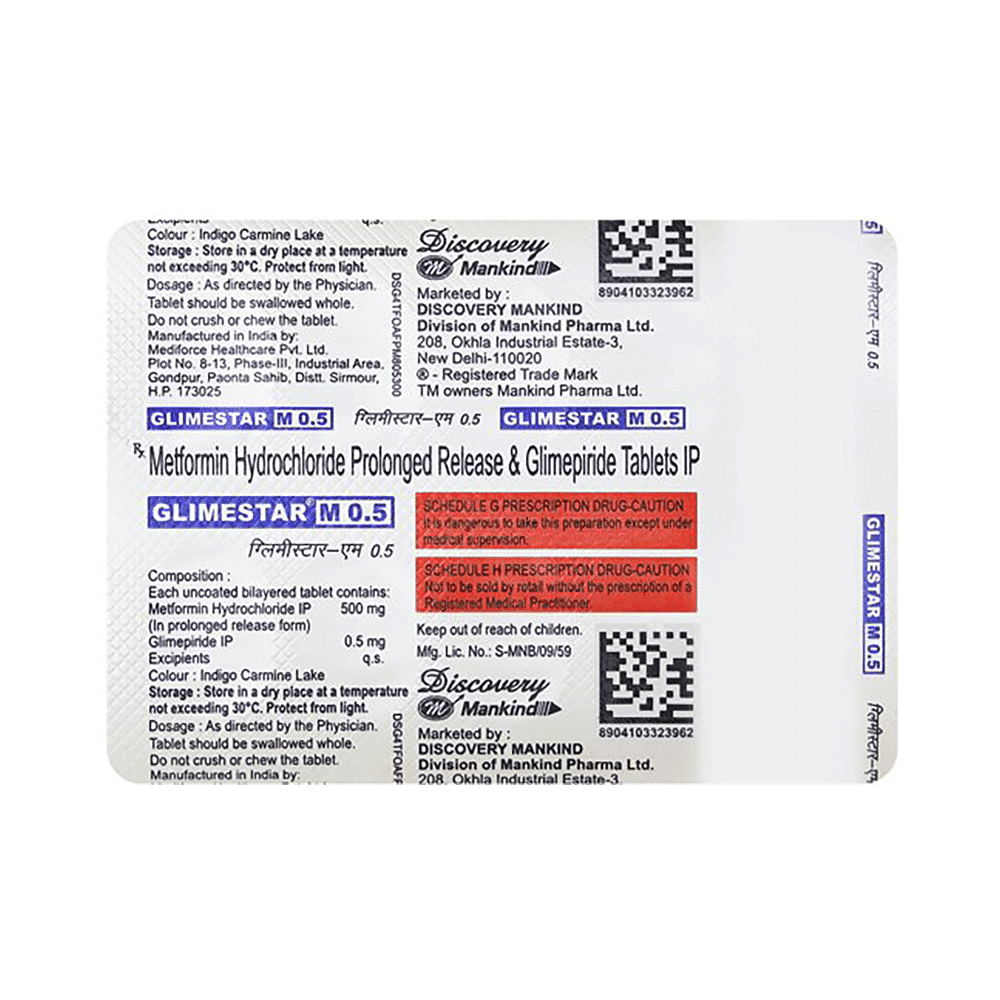
Galega G 0.5mg/500mg Tablet
Manufacturer
Edoc Life Sciences Pvt Ltd
Salt Composition
Glimepiride (0.5mg) + Metformin (500mg)
Key Information
Short Description
Galega G 0.5mg/500mg Tablet is a combination of two medicines used to treat type 2 diabetes mellitus in adults. It helps control blood sugar levels in people with diabetes.
Dosage Form
Tablet
Introduction
Galega G 0.5mg/500mg Tablet belongs to a category of medicines known as anti-diabetic drugs. It is a combination of two medicines used to treat type 2 diabetes mellitus in adults. It helps control blood sugar levels in people with diabetes.
Directions for Use
Take this medicine in the dose and duration as advised by your doctor. Swallow it as a whole. Do not chew, crush or break it. Galega G 0.5mg/500mg Tablet is to be taken with food.
Safety Information
Side Effects
It can cause hypoglycemia (low blood sugar level) when used with other antidiabetic medicines, alcohol or if you delay or miss a meal.
Alcohol Warning
It is unsafe to consume alcohol with Galega G 0.5mg/500mg Tablet.
Breastfeeding Warning
Galega G 0.5mg/500mg Tablet is unsafe to use during breastfeeding. Data suggests that the drug may cause toxicity to the baby.
Pregnancy Warning
Galega G 0.5mg/500mg Tablet may be unsafe to use during pregnancy. Although there are limited studies in humans, animal studies have shown harmful effects on the developing baby. Your doctor will weigh the benefits and any potential risks before prescribing it to you. Please consult your doctor.
How it works
Galega G 0.5mg/500mg Tablet is a combination of two antidiabetic medicines: Glimepiride and Metformin. Glimepiride is a sulfonylurea which works by increasing the amount of insulin released by the pancreas in order to lower the blood glucose. Metformin is a biguanide which works by lowering glucose production in the liver, delaying glucose absorption from intestines and increasing the body's sensitivity to insulin.
Quick Tips
Inform your doctor about your diabetes treatment if you are due to have surgery under a general anesthetic. Tell your doctor immediately if you experience any deep or rapid breathing or if you have persistent nausea, vomiting and stomach pain as Galega G 0.5mg/500mg Tablet may cause a rare but serious condition called lactic acidosis which is an excess of lactic acid in the blood. Your doctor may check your liver function regularly. Inform your doctor if you develop symptoms such as abdominal pain, loss of appetite or yellowing of the eyes or skin (jaundice).
Related Medicines

Glimigem M 0.5mg/500mg Tablet

Gride M 0.5mg/500mg Tablet

Glynamic M 0.5mg/500mg Tablet

Glimicid M 0.5mg/500mg Tablet

Glyzanda M 0.5mg/500mg Tablet

Switglim M 0.5mg/500mg Tablet

Glucoryl-M 0.5mg/500mg Tablet

Glimison-M 0.5mg/500mg Tablet

Idepride 0.5mg/500mg Tablet

Glimestar-M 0.5mg/500mg Tablet
Frequently asked questions
What are the recommended storage conditions for Galega G 0.5mg/500mg Tablet?
Store this medicine in the container or the pack it came in, tightly closed. Ensure that it is stored according to the instructions mentioned on the label. Do not consume unused medicine, and make sure that it is not available for pets, children, or other individuals.
Can Galega G 0.5mg/500mg Tablet cause lactic acidosis?
Yes, the use of Galega G 0.5mg/500mg Tablet can lead to lactic acidosis. This is a medical emergency that results from an increase in lactic acid levels in the blood. It is also known as MALA (Metformin-associated lactic acidosis). It is considered harmful for individuals with underlying kidney disease, the elderly, or those who consume large quantities of alcohol. Symptoms include muscle pain or weakness, dizziness, fatigue, feeling of cold in the arms and legs, difficulty breathing, nausea, vomiting, stomach pain, or a slow heart rate. If you experience these symptoms, stop taking Galega G 0.5mg/500mg Tablet immediately and consult your doctor.
What is Galega G 0.5mg/500mg Tablet?
Galega G 0.5mg/500mg Tablet is a combination of two medicines: Glimepiride and Metformin. This medication is prescribed to treat type 2 diabetes mellitus (DM). It helps in improving blood sugar levels in adults when used along with a proper diet and regular exercise. Glimepiride lowers blood glucose by increasing the release of insulin from the pancreas, while metformin works by reducing glucose production in the liver and improving insulin sensitivity. This combination is not indicated for treating type 1 diabetes.
What are the possible side effects of Galega G 0.5mg/500mg Tablet?
The use of Galega G 0.5mg/500mg Tablet may lead to common side effects, including hypoglycemia (low blood sugar level), altered taste, nausea, stomach pain, diarrhea, and headache. It can also cause serious but rare side effects like lactic acidosis. Long-term use can increase the risk of Vitamin B12 deficiency.
Can the use of Galega G 0.5mg/500mg Tablet lead to Vitamin B12 deficiency?
Yes, long-term use of Galega G 0.5mg/500mg Tablet may cause Vitamin B12 deficiency due to interference with the absorption of Vitamin B12 in the stomach. Untreated Vitamin B12 deficiency can lead to anemia and nerve problems, causing tingling sensations in the hands and feet, weakness, urinary problems, changes in mental status, and difficulty maintaining balance (ataxia). To avoid such complications, it is recommended to consume Vitamin B12 from external sources at least once a year.
Can the use of Galega G 0.5mg/500mg Tablet cause hypoglycemia?
Yes, the use of Galega G 0.5mg/500mg Tablet can lead to hypoglycemia (low blood sugar level). Symptoms include nausea, headache, irritability, hunger, sweating, dizziness, a fast heart rate, and feelings of anxiety or shakiness. This is more likely if you miss meals, drink alcohol excessively, exercise intensely, or take other antidiabetic medications simultaneously. Regular monitoring of your blood sugar levels is important to prevent hypoglycemia.
Is it safe to consume alcohol while taking Galega G 0.5mg/500mg Tablet?
No, consuming alcohol together with Galega G 0.5mg/500mg Tablet is not advised as it may lower your blood sugar levels and increase the likelihood of hypoglycemia. This could also exacerbate lactic acidosis.


